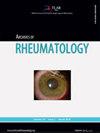强直性脊柱炎老年和年轻患者的生物治疗:TURKBIO 真实数据结果
IF 1.1
4区 医学
Q4 Medicine
引用次数: 0
摘要
研究目的本研究旨在探讨年龄对强直性脊柱炎(AS)患者疾病活动性和生物治疗的影响。患者和方法:2011年至2019年期间,共有811名强直性脊柱炎患者在TURKBIO登记数据库中登记,研究人员根据患者登记时的年龄对其进行分类,并将其归入两组中的一组:定义为年龄小于60岁的年轻患者(n=610)和年龄≥60岁的老年患者(n=201)。每次就诊时,均使用开源软件对人口统计学、临床和实验室特征、疾病活动指标和其他随访参数以及当前和之前的治疗进行电子记录。结果老年患者的平均年龄为(67±5.8)岁,年轻患者的平均年龄为(49.2±10.9)岁。老年强直性脊柱炎组的男性比例低于年轻强直性脊柱炎组(P=0.002)。在随访期间,397 名患者(包括 318 名年轻患者和 79 名老年患者)至少使用过一种生物改良药物(bDMARD)。两组患者在DMARD和bDMARD使用分布方面没有明显差异。在10年的随访中,两组患者的首次肿瘤坏死因子抑制剂(TNFi)保留率相似。年轻(19.9%)和老年(26.8%)AS患者的不良事件发生率相似。结论TURKBIO队列的研究显示,老年和年轻的强直性脊柱炎患者的疾病活动水平相似,治疗方法也相当。此外,老年患者的TNFi治疗效果与年轻患者相同,安全性问题也没有明显增加。本文章由计算机程序翻译,如有差异,请以英文原文为准。
Biological treatment in elderly and young patients with ankylosing spondylitis: TURKBIO real-life data results
Objectives: This study aims to investigate the effect of age on disease activity and biological treatment in patients with ankylosing spondylitis (AS).
Patients and methods: A total of 811 AS patients registered in the TURKBIO registry database between 2011 and 2019 were categorized according to their age at the time of entry into the registry and assigned to one of two groups: young patients, defined as <60 years of age (n=610), and those aged ≥60 years (n=201) were recorded as elderly patients. Demographic, clinical, and laboratory characteristics, along with disease activity markers and other follow-up parameters, as well as current and prior treatments, were electronically recorded during each visit using open-source software.
Results: The mean age of the elderly patients was 67±5.8 years, while the mean age of the younger patients was 49.2±10.9 years. Male predominance was lower in the older AS group compared to the younger AS group (p=0.002). During follow-up period, 397 patients (comprising 318 young and 79 elderly individuals) had a history of using at least one biological disease-modifying agent (bDMARD). There was no significant difference between the groups in terms of DMARD and bDMARD-use distributions. First tumor necrosis factor inhibitor (TNFi) retention rates were found to be similar in both groups over 10 years of follow-up. Adverse events were found to be similar in young (19.9%) and elderly (26.8%) AS patients.
Conclusion: Research in the TURKBIO cohort reveals that both older and younger patients with AS exhibited similar disease activity levels with comparable treatment approaches. Moreover, the results of TNFi treatments in elderly patients were the same as those observed in younger patients, with no notable increase in safety concerns.
求助全文
通过发布文献求助,成功后即可免费获取论文全文。
去求助
来源期刊

Archives of rheumatology
Medicine-Rheumatology
CiteScore
2.00
自引率
9.10%
发文量
15
期刊介绍:
The Archives of Rheumatology is an official journal of the Turkish League Against Rheumatism (TLAR) and is published quarterly in March, June, September, and December. It publishes original work on all aspects of rheumatology and disorders of the musculoskeletal system. The priority of the Archives of Rheumatology is to publish high-quality original research articles, especially in inflammatory rheumatic disorders. In addition to research articles, brief reports, reviews, editorials, letters to the editor can also be published. It is an independent peer-reviewed international journal printed in English. Manuscripts are refereed by a "double-blind peer-reviewed" process for both referees and authors.
Editorial Board of the Archives of Rheumatology works under the principles of The World Association of Medical Editors (WAME), the International Council of Medical Journal Editors (ICMJE), and Committee on Publication Ethics (COPE).
 求助内容:
求助内容: 应助结果提醒方式:
应助结果提醒方式:


